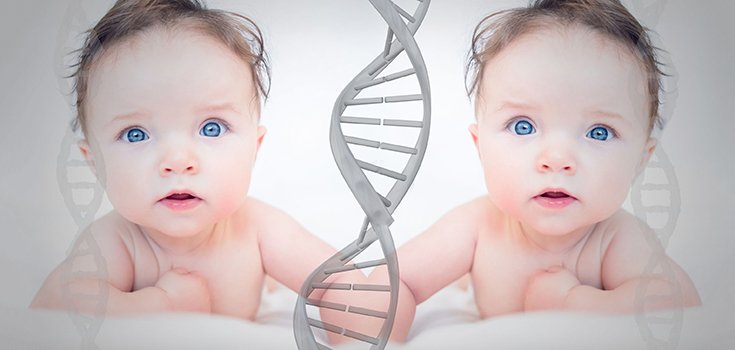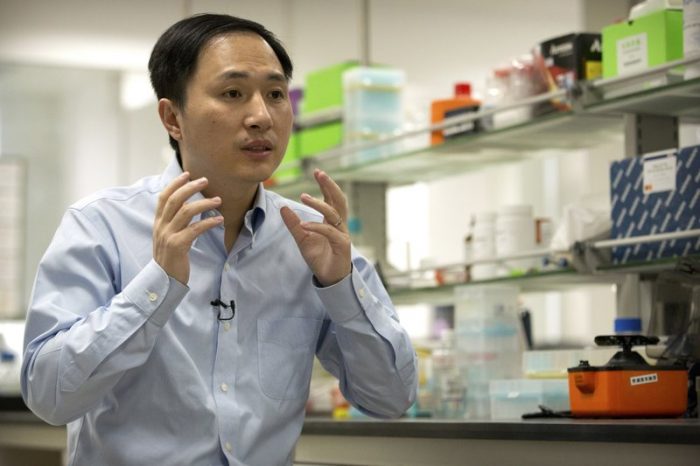Chinese Scientist Claims to Have Made World’s 1st Gene-Edited Babies

A researcher in China claims to have created the world’s first gene-edited babies, sparking deep discussion, along with some harsh criticisms and outrage among some of the world’s leading scientists.
A U.S. scientist reportedly took part in the research, which had to take place in China because this type of gene-editing is not currently legal in the U.S. The primary concern associated with the technology is that it has the potential to pass genetic changes on to future generations and harm other genes – largely making up what we would call ‘unforeseeable consequences.’
Researcher He Jiankui of Shenzhen said he edited embryos for 7 couples who were being treated for fertility problems. He said he wasn’t trying to cure or prevent any inherited diseases; the goal of the experiments was to give the babies the ability to resist possible infection to HIV, the virus that causes AIDS.
Jiankui revealed his work on November 26 in Hong Kong at an international conference on gene-editing that began November 27. So far, his claims have not been confirmed, nor have they been published in a peer-reviewed scientific journal.
Study: CRISPR Gene-Editing Ignites Tons of Unintentional Genetic Mutations
Jiankui said:
“I feel a strong responsibility that it’s not just to make a first, but also make it an example.”
He added that “society will know what to do next” in terms of whether his work should move forward.
In the U.S., CRISPR-Cas9 may only be used for lab research. The technology cannot be used for editing sperm, eggs, or embryos. China outlaws human cloning, but not gene-editing.
Tinkering With Humanity’s Blueprint
All of the men in the project had HIV, while all of the women were free of infection. Jiankui aimed to offer couples affected by HIV the opportunity to have a child that might be protected from suffering the same fate.
The babies’ genes were edited during in-vitro fertilization (IVF) treatment. First, the sperm was separated from the semen, which is where the HIV virus tends to hide out. Then, a single sperm was placed into a single egg to create an embryo. Finally, the gene-editing tool was added.
Jiankui removed a few cells from the embryos once they reached 3 to 5 days old and checked them for editing. Couples had the option of using edited or unedited embryos for implantation. In total, 16 of 22 embryos were used in 6 implant attempts before the twin pregnancy was achieved.
Tests showed that 1 twin had both copies of the altered gene, while the other twin had just 1. There was no evidence that the experiment caused harm to any other genes. People with a single copy of the gene can still acquire HIV, but some very limited research suggests the health of those individuals will decline more slowly once they do.
On November 28, Jiankui announced that a 2nd pregnancy may be underway, but it is in its very early stages and needs more time to be monitored to see if it will “take.”
Concern and Outrage Among Leading Scientists

Leading scientists were quick to condemn the experiments, saying there were more questions than answers following Jiankui’s talk. The leader of the conference himself called the experiments “irresponsible” and said that they were evidence that the scientific community had failed to regulate itself to prevent premature DNA-altering efforts.
Jiankui defended his attempts, saying that the genetically-modified twins “need this protection since a vaccine is not available.”
Read: CRISPR Gene-Editing Tool Linked to Increased Cancer Risk in Studies
But his colleagues dismissed his argument – including the very people behind the technology used to alter the genes.
Following Jiankui’s talk, Jennifer Doudna, a University of California-Berkeley scientist and one of the inventors of the CRISPR gene-editing tool, said:
“This is a truly unacceptable development. I’m grateful that he appeared today, but I don’t think that we heard answers. We still need to understand the motivation for this.”
David Liu of Harvard and MIT’s Broad Institute, and inventor of a variation of the gene-editing tool, added:
“I feel more disturbed now. It’s an appalling example of what not to do about a promising technology that has great potential to benefit society. I hope it never happens again.”
But it probably will happen again.
China has a history of performing controversial scientific experiments. For example, in 2016, scientists in that country became the first to inject humans with genes edited using CRISPR. In that experiment, genetically modified cells were delivered into a patient with aggressive lung cancer. The patient’s own immune cells were modified to make them more efficient at combating cancer cells.
In 2015, researchers in China announced plans to create a genetically modified “micro pig” which would stay forever small in an effort to help scientists study and resolve human health problems. However, the DNA-editing company responsible for the pig decided to sell the Franken-swine as pets for $1,600.
And gene-editing experiments for the purpose of making people immune to HIV – or at least less likely to contract the virus – are nothing new. In 2015, scientists in China said they had successfully added mutations to human embryos which made them HIV-proof. The experiment resulted in the creation of 4 embryos, but none of them were used to induce pregnancy.
Note: The article’s featured image is merely to represent the story and is not one of the actual twins born through CRISPR.
Sources:
[2] USA Today
